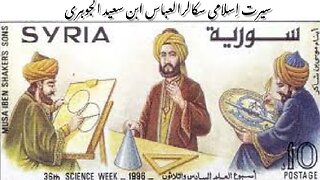Premium Only Content

Do not betray trusts विश्वास के साथ विश्वासघात न करें قرآنی احکام (امانت میں خیانت نہ کرو)
@islamichistory813 #quranic #commands #on #justice #and #fair #dealing #do #not #betray #trusts #healing #and #events #from #the #quran #historical #stories #and #events #quranicstories #selfhealing #success #stories #striking #events #in #history #quranstories, #storiesfromthequran #religious #creation #stories #trending #quran #short #historical #loves #historical #heroes #what #is #true #strength #calm #quran #recitation #for #babies #islamic #healing
Quranic Commands on Justice and Fair Dealing: Do Not Betray Trusts
Assalamu Alaikum, wa Rahmatullahi wa Barakatuhu.
Brothers, sisters, friends and elders, we are presenting the 49th episode of the Islamic informative video based on healing and events from the Holy Quran, and in this episode we will describe, Quranic Commands on Justice and Fair Dealing: Do Not Betray Trusts (Surah An-Nisa 4:58)
The Quran is a comprehensive guide that lays the foundation for a just, ethical, and morally responsible society. Among its many commandments, one of the most crucial is the emphasis on fulfilling trusts and acting with integrity in every aspect of life. Surah An-Nisa (4:58) declares: *“Indeed, Allah commands you to render trusts to whom they are due and when you judge between people, to judge with justice. Excellent is that which Allah instructs you. Indeed, Allah is ever Hearing and Seeing.”* This verse brings together two of the most essential principles in Islam—trustworthiness and justice—highlighting that both are not only social obligations but divine commands. A society that respects these values thrives on mutual respect, security, and moral clarity, while their absence leads to corruption, betrayal, and disorder.
The first part of the verse, *“Indeed, Allah commands you to render trusts to whom they are due,”* points to the profound importance of amanah (trust) in Islam. Trust is not limited to safeguarding someone’s wealth or belongings; it extends to responsibilities, duties, confidential information, leadership roles, and even religious and moral obligations. Trust is a sacred contract between individuals and between humanity and Allah. When someone is entrusted with something—whether it’s public office, financial responsibility, or even a spoken promise—they are morally and spiritually obliged to fulfill it with honesty and care. The Quran elevates this act of trust-keeping from being merely a good trait to being a command from Allah Himself, thereby making it a part of a believer’s religious duty.
This command is especially relevant in today’s world where trust is often violated for personal gain, political ambition, or social influence. Whether it’s a leader betraying the people, an employer deceiving their workers, or someone breaking a private confidence, betrayal of trust weakens the very fabric of a healthy society. Islam condemns such behavior in the strongest terms, linking it with hypocrisy and spiritual failure. The Prophet Muhammad (peace be upon him) said: *“There are three signs of a hypocrite: when he speaks, he lies; when he makes a promise, he breaks it; and when he is entrusted, he betrays the trust.”* This hadith shows that violating trust is not a small mistake but a major moral flaw that contradicts true faith.
The second part of the verse—*“and when you judge between people, judge with justice”*—complements the first by connecting trust with fair judgment. To judge justly is a trust in itself, especially when one is in a position of authority or influence. Whether someone is a judge in a court, a teacher in a school, a parent among children, or an employer among employees, every decision that affects others should be based on fairness, not bias, favoritism, or personal interest. The Quran emphasizes that justice is not only a legal requirement but a spiritual duty. It must be upheld regardless of relationships, status, or wealth. Every decision should reflect the truth and benefit the one who deserves it—not the one who is more powerful or persuasive.
The verse goes on to say, *“Excellent is that which Allah instructs you.”* This statement is both a reminder and a motivation. Allah’s commands are not burdens but blessings. His instructions are designed to create harmony, stability, and moral strength in society. When people fulfill trusts and judge fairly, they establish a community based on reliability, where people feel safe and valued. The reward for such behavior is not only social peace but also divine favor in this world and the hereafter. Conversely, betrayal and injustice lead to mistrust, division, and ultimately, divine punishment.
The verse concludes with the powerful reminder: *“Indeed, Allah is ever Hearing and Seeing.”* This final sentence reinforces the accountability of every individual. No betrayal, no act of injustice, no broken promise goes unnoticed by Allah. Even if someone escapes worldly consequences, they are still answerable to the One who hears every word and sees every action. This knowledge instills a deep sense of responsibility in a believer’s heart. Knowing that Allah is watching encourages Muslims to act with sincerity and honesty, not just in public but even when no one else is watching.
In conclusion, Surah An-Nisa (4:58) provides a timeless commandment that highlights two foundational principles of a just society: fulfilling trusts and judging with fairness. These are not optional virtues but divine instructions tied directly to faith. In Islam, a true believer is recognized by their trustworthiness and their commitment to justice. This verse reminds every Muslim—whether an ordinary person or a leader—that they are caretakers of the trusts placed upon them and that their decisions must reflect the justice of Allah. When these principles are upheld, society flourishes; when they are neglected, chaos and corruption take root. Therefore, by obeying this Quranic command, we not only strengthen our social ties but also draw nearer to Allah’s pleasure and eternal success.
With this, we ask for your permission until tomorrow and pray to Allah Almighty to grant us the ability to act on the Quran and Hadith, Amen
Allah Hafiz
============================
-
 7:53
7:53
ISLAMIC HISTORY
48 minutes agoBiography of Al-Abbas ibn Said al-Jawhari سیرت العباس بن سعید الجوہری
1 -
 1:08:10
1:08:10
The Rubin Report
2 hours agoAOC Doesn’t Realize How Much She Hurt Dems Shutdown Chances by Saying This
29.1K16 -
 LIVE
LIVE
The Shannon Joy Show
1 hour agoTrojan Horse Trump Whores Out To Pfizer AGAIN W/ $70B Deal To mRNA - LIVE W/ Sasha Latypova!
388 watching -
 LIVE
LIVE
LFA TV
13 hours agoLIVE & BREAKING NEWS! | WEDNESDAY 10/1/25
4,451 watching -
 30:49
30:49
Rethinking the Dollar
2 hours agoMarkets Panic: Government Shutdown Sends Gold & Bitcoin Higher | Morning Check-In: Let's Talk...
6.22K -
 LIVE
LIVE
Trumpet Daily
1 hour ago $0.56 earnedTrumpet Daily LIVE | Oct. 1, 2025
424 watching -
 1:00:55
1:00:55
VINCE
4 hours agoSOMBRERO-GATE! | Episode 137 - 10/01/25
223K177 -

MYLUNCHBREAK CHANNEL PAGE
4 hours ago1000's of Miles of Tunnels
56.3K6 -
 1:08:12
1:08:12
The Big Mig™
3 hours agoSchumer Government Shutdown Screwing America AGAIN!
22K8 -
 DVR
DVR
Bannons War Room
7 months agoWarRoom Live
38.9M9.03K